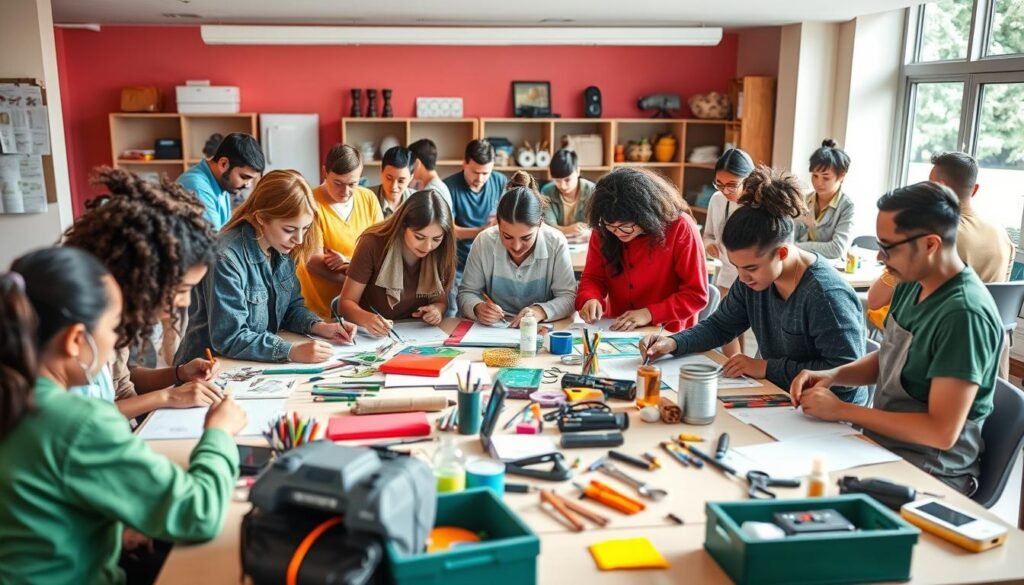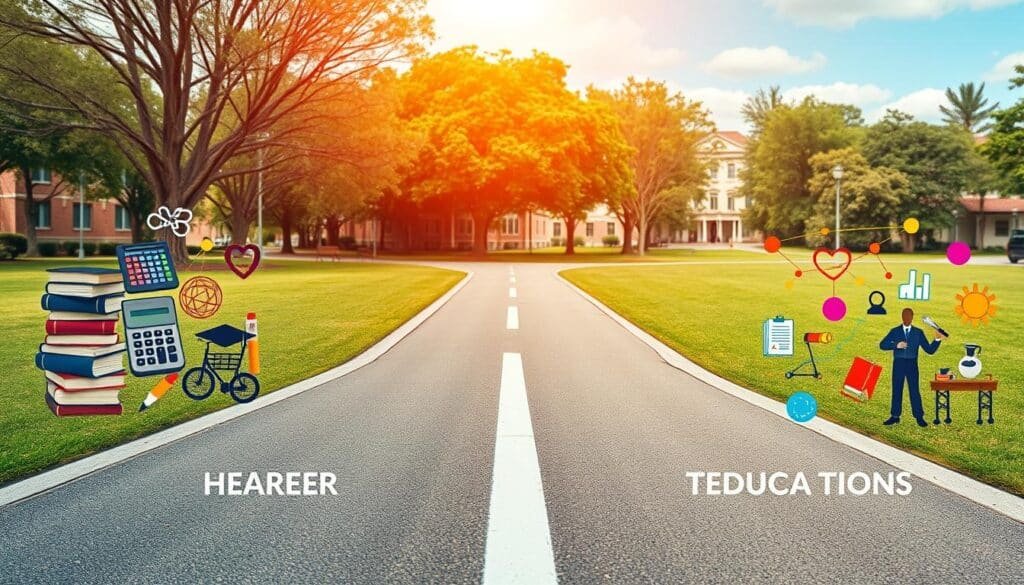University career counseling is a key service for students. It helps them find their way in the career world. Through talks, tests, and activities, they learn to use their strengths and explore different careers.
Career counselors help students figure out their skills, interests, and goals. They guide them in picking a career that makes them happy. This is especially helpful for those who are still unsure about their future or want to change careers.
Key Takeaways
- University career counseling helps students identify their strengths, interests, and values to make informed career decisions.
- Early career planning can improve academic performance and save students from costly changes in their academic path.
- Assessments and one-on-one sessions provide valuable insights that steer students towards a suitable career alignment.
- Career counseling supports personal development by building professional identity and work-life balance preferences.
- Hands-on experiences, such as job shadowing, help students determine if a career path is a good fit.
Understanding the Role of Career Counseling in Academic Success
University counseling plays a big role in a student’s success. It helps students match their studies with their future careers. This way, they can do better in school and make smart choices about their majors and classes, saving money later on.
Benefits of Early Career Planning
Career counseling helps students find what they’re interested in and good at. It lets them look into different careers that might suit them. This way, they can choose the right path early, saving time and money.
Impact on Academic Performance
Knowing their career goals motivates students to do well in school. Career counseling shows them what they need to do to reach their goals. This helps them do better in their classes.
Cost-Saving Benefits of Early Career Decisions
Deciding on a career early helps students make smart choices about their studies. They can pick the right major and classes. This avoids costly changes later, saving them money.
“What Can I Do With This Major?” serves as a valuable tool for students to explore career paths related to their chosen majors, helping them make informed decisions about their academic and professional future.
Career counseling is key to academic success. It helps students match their studies with their career dreams. This boosts their performance, saves money, and prepares them for a fulfilling career.
The Power of Skills and Interest Assessment

Finding the right career can be tough, but university career counseling helps. It uses skills assessment and interest evaluation to uncover a student’s true potential. These tools reveal a student’s unique abilities and what they enjoy doing.
Career counselors use different methods to assess students. They look at favorite classes, extracurricular activities, and personality tests like the Myers-Briggs Type Indicator or DiSC Profile. These tools help find careers that match a student’s skills and interests, leading to job happiness and success.
Understanding their career aptitude helps students choose the right academic majors and career paths. This journey of self-discovery lets them find fields that truly excite and challenge them. It makes their professional life more fulfilling and rewarding.
| Assessment Tool | Key Insights |
|---|---|
| Myers-Briggs Type Indicator (MBTI) | Identifies personality preferences and how an individual interacts with the world, providing a framework for understanding work styles and potential career fits. |
| DiSC Profile | Examines an individual’s behavioral tendencies, communication styles, and problem-solving approaches, helping to determine compatible work environments and roles. |
| Holland’s Theory of Career Choice | Classifies people and work environments into six broad categories (Realistic, Investigative, Artistic, Social, Enterprising, and Conventional), guiding individuals towards careers that align with their interests and personality. |
University career counseling uses skills and interest assessments to guide students. It helps them make informed choices, explore various opportunities, and find fulfillment in their careers.
“The more you know about yourself, the more you can make informed decisions about your future.”
University Career Counseling: Services and Support Systems
University career counseling centers provide a wide range of services to help students find their way. They offer one-on-one counseling, career assessments, and professional development workshops. These resources create a strong support system for students.
One-on-One Counseling Sessions
Students get to talk one-on-one with career advisors. These sessions help them explore their career dreams. They can discuss their interests, skills, and values to find the right path.
Each student’s needs are addressed in these sessions. This helps them make smart choices about their future.
Career Assessment Tools and Resources
These centers have many tools and resources for students. They help students understand their strengths, interests, and personality. This gives them insights into careers that might suit them.
They also offer job search databases, resume-building workshops, and mock interviews. These tools help students improve their job search skills.
Professional Development Workshops
Workshops and seminars are organized to help students grow professionally. Topics include resume writing, interview prep, networking, and personal branding. These sessions help students develop skills for their career search and workplace interactions.
University career counseling services offer a comprehensive approach. They help students explore their career options, find support, and grow professionally. By using these resources, students can confidently navigate their career journey.
Exploring Academic Preferences and Career Alignment

Career counseling is crucial for students to find the link between their favorite subjects and future careers. Counselors look at students’ top subjects and strengths to guide them. This helps in choosing the right major and courses, aligning with their career goals.
University career counseling helps students see how their academic likes match with career paths. Counselors use detailed assessments and personal advice. They help students find careers that match their skills and interests.
For instance, a science whiz who loves solving problems might be perfect for engineering or data analytics. On the other hand, someone who excels in humanities and communication could do well in marketing, public relations, or journalism. Knowing these connections helps students choose their major and career path wisely.
| Academic Preferences | Potential Career Alignment |
|---|---|
| Strong in sciences, analytical problem-solving | Engineering, data analytics |
| Interest in humanities, effective communication | Marketing, public relations, journalism |
| Passion for creative expression, design | Graphic design, architecture, advertising |
| Fascination with technology, programming | Computer science, software development, cybersecurity |
By exploring this connection, students can make better choices for their major and career. This leads to more job satisfaction and success.
“Aligning your academic preferences with your career aspirations is the key to unlocking your full potential and finding fulfillment in your work.”
Personal Development Through Career Guidance

University career counseling does more than just look at job options. It helps students grow by building their professional identity. They explore their passions, values, and life views to set their career goals and objectives.
Career counselors guide them in finding what they want in work-life balance. They consider things like income, job type, and lifestyle.
This approach makes sure students’ career choices match their personal values and goals. It helps them make choices that bring long-term happiness and success in their studies and careers.
Building Professional Identity
Career counseling lets students discover their strengths, interests, and traits. This helps them create a clear professional identity. They learn how they can find joy in their future jobs.
Developing Career Goals and Objectives
With career counselors’ help, students set clear career goals and objectives. This plan gives them direction and motivation. It helps them stay on track to reach their long-term dreams.
Understanding Work-Life Balance Preferences
Career counseling also helps students understand their work-life balance preferences. They consider income, job type, and lifestyle. This way, they make choices that fit their values and priorities, leading to a rewarding career.
“Career guidance is a multidisciplinary field incorporating principles from education, sociology, psychology, and labor economics.”
Practical Experience and Real-World Exposure
University career counseling is key in giving students real-world career insights. Through counselors, students can try out job shadowing, internships, and informational interviews. These experiences show what different jobs are really like, helping students decide if a career is right for them.
Job shadowing lets students see professionals at work. They learn about the job’s duties, challenges, and benefits. This experience helps students make better choices about their future careers.
Internships give students a chance to work in a real job. They learn important skills and get practical experience. Research shows that interns often get jobs in their field right after graduation. Many companies, especially in healthcare and finance, check backgrounds before hiring.
Informational interviews let students talk to professionals in their dream jobs. They get real insights into the workplace. These talks can also lead to networking and mentorship, helping students grow in their careers.
By trying out these experiences, students can match their studies with real jobs. This leads to more informed and satisfying career choices.
“Employers and the public feel universities are not adequately preparing students for the workforce.”
University career counseling is vital in preparing students for the real world. It helps bridge the gap between school and work. By offering these experiences, counselors help students make better choices and succeed in their careers.
Also Read: How To Choose The Right Online Degree Programs?
Conclusion
University career counseling is key in guiding students to successful careers. It offers personalized support, skills checks, and real-world experiences. This helps students make smart choices about their future jobs.
It leads to better grades, saving money, and job happiness. Career counselors play a big role in helping students find their way.
They help students match their skills, interests, and values with their studies and jobs. This approach prepares students for the changing job market.
Students can get career assessments, one-on-one advice, and hands-on experience at university career centers. By using these resources, students can set themselves up for success in their careers.
FAQs
Q: How can the university career center assist me in finding a job or internship?
A: The university career center offers a range of career services including career coaching, resume reviews, and access to job listings. You can meet with staff to explore your options and develop a strategy for successful job applications.
Q: What types of events does the career center host?
A: The career center hosts various events such as career fairs, networking events, and workshops. These events provide students and alumni the opportunity to connect with employer partners and learn about available jobs and internships.
Q: How can I prepare for an upcoming career fair?
A: To prepare for a career fair, engage with career coaching services offered by the career center. Review your resume, research participating employers, and practice your handshake and elevator pitch to make a great first impression.
Q: Can I schedule an appointment with a career coach?
A: Yes, you can schedule an appointment with a career coach at the university career center. They can provide personalized guidance to help you explore career options and prepare for job searches.
Q: What resources are available for recent graduates?
A: Recent graduates can access a variety of resources through the career center, including job postings, alumni networking opportunities, and career readiness workshops designed to assist in successfully launching their career paths.
Q: How do I make connections with employer partners?
A: You can make connections with employer partners by attending career fairs, networking events, and on-campus interviews organized by the career center. These events allow you to meet potential employers and learn about job openings.
Q: What should I expect during a career coaching session?
A: During a career coaching session, you can expect to discuss your career goals, receive feedback on your resume, and develop a tailored job search strategy. Coaches can also help you prepare for interviews and connect with relevant resources.
Q: Are there any specific programs for students seeking internships?
A: Yes, the career center offers various programs aimed at helping students secure internships. These include internship fairs, workshops on how to apply for internships, and connections with organizations looking for interns.
Q: How can I access digital resources from the career center?
A: The career center provides digital resources such as online job boards, webinars, and instructional videos that you can access anytime to aid in your job search and career readiness.
Source Links
- https://admissions.usf.edu/blog/how-college-counselors-can-help-students-choose-a-career-path
- https://www.boisestate.edu/career/what-is-career-counseling/
- https://ati.osu.edu/academics/college-success-and-career-planning
- https://www.creatrixcampus.com/blog/career-counseling-student-success
- https://trumotivate.com/career-counseling-college-students/
- https://www.powerschool.com/blog/cultivating-career-interests-of-students-to-support-long-term-success/
- https://career.missouri.edu/career-interest-game/
- https://career-center.brown.edu/
- https://www.williamjames.edu/students/services-resources/career-services.html
- https://hr.wisc.edu/career-counseling/
- https://www.marist.edu/academic-resources/career-services
- https://career.engin.umich.edu/careerexploration/
- https://naceweb.org/career-readiness/best-practices/purposeful-career-planning-transactional-vs-transformational-career-readiness
- https://www.linkedin.com/pulse/career-guidance-path-informed-decisions-personal-growth-mankar-k5v5c
- https://www.simmons.edu/student-life/student-support-resources/career-development/career-resources/5-step-career
- https://www.naceweb.org/career-readiness/trends-and-predictions/exploring-the-influence-of-course-based-career-experiences-and-faculty-on-students-career-preparation/
- https://hellorubric.com/2024/11/06/student-workforce-exposure/
- https://aucenter.edu/why-is-career-exploration-important/
- https://nacada.ksu.edu/Resources/Clearinghouse/View-Articles/Integrating-career-and-academic-advising.aspx
- https://career.fsu.edu/students/undergraduate-students/plan-your-career/career-decision-making





